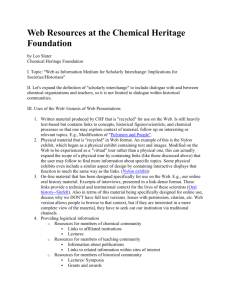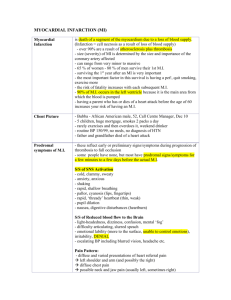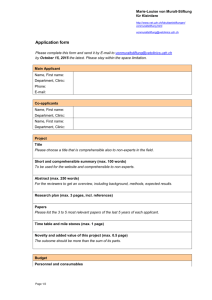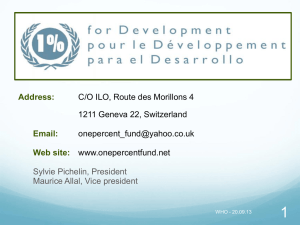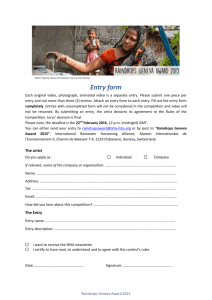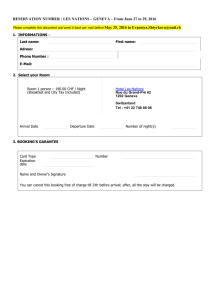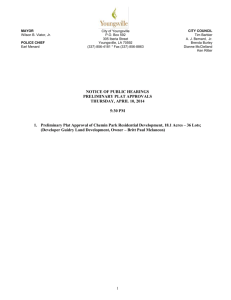Spring School of Global Health
advertisement
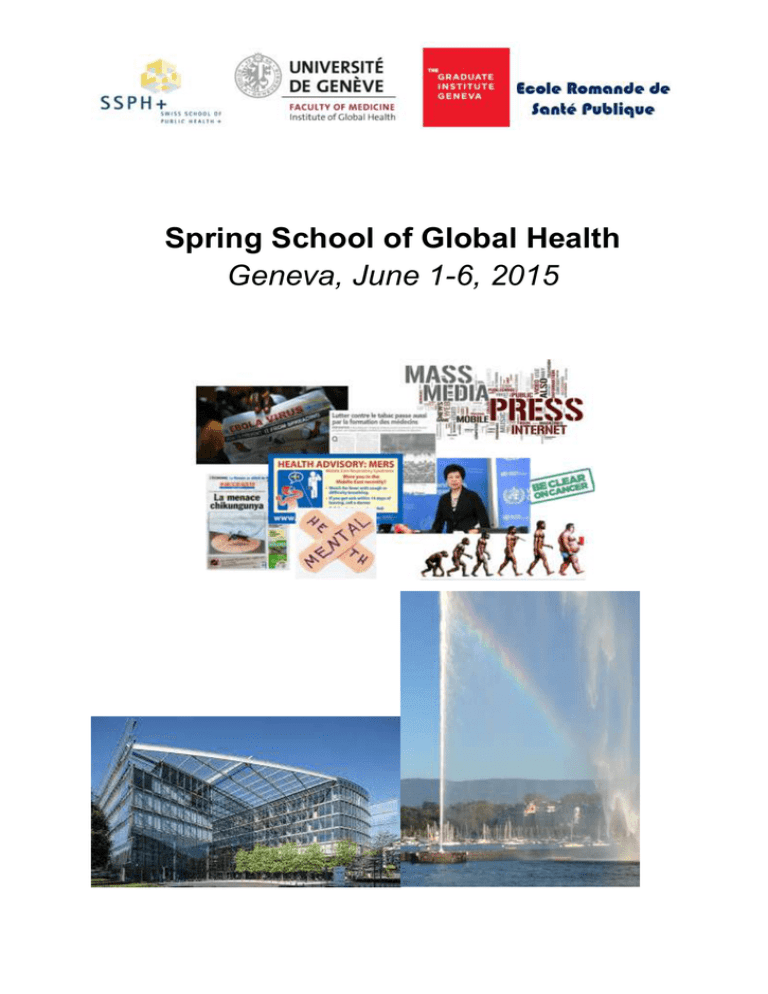
Spring School of Global Health Geneva, June 1-6, 2015 Spring School of Global Health Geneva, June 1-6, 2015 Provisionnal agenda 8 x 3 day-courses are delivered: Monday June 1rst to Wednesday June 3rd GH-1 : Stewardship in Global Health Ilona Kickbusch, Marcel Tanner and Gaudenz Silberschmidt GH-2 : Preparing a national delegate for debates during the World Health Assembly Yves Charpak GH-3 : Fighting Health Inequalities, from contemplation to implementation Johannes Siegriest and Silvia Stringhini GH-4 : Health Promotion, Prevention as cobenefits of fighting Climate Change Stefanie Schütte and Thomas Mattig Thursday June 4rth to Saturday June 6th GH-5 : Policy and Technical Briefs in the agenda of the WHA Antoine Flahault, Ilona Kickbusch and Michaela Told with the participation of the World Federation of Academic Institutions of Global Health (WFAIGH) GH-6 : Mental health and the Global Health Agenda – the Tree, the Forest, and the low-hanging fruit. Emiliano Albanese and Benedetto Saraceno GH-7 : Non-communicable disease control: Public Health and Health Service Approaches Pascal Bovet and Kaspar Wyss GH-8 : Implementing control of nosocomial infections : a European case study Walter Zingg and Didier Pittet Venue : Campus Biotech, Chemin des Mines 9, 1202 Genève Public : Priority is given to PhD students registered at SSPH+, other PhD students, and any other professionnals or students equipped with master degrees in the (various) fields of Global Health. Fees : Each course is charged 900 CHF (academics) or 1'800 CHF (industry), waivers for SSPH+ students. Credits : Each course is granted 1 ECTS, corresponding to 25-30 hrs of student work All applications must be done online on http://... Deadlines for applications : March 31, 2015 Spring School of Global Health GH-1 : Stewardship in Global Health Course coordinators Prof. Ilona Kickbusch, Graduate Institute Geneva Prof. Marcel Tanner, Swiss TPH, Basel Prof. Gaudenz Silberschmidt, WHO, Geneva Themes 1. How global governance for health influences policies? 2. Who to reform aid, cooperation and partnership for global health development 3. How to reform WHO? In this module, during the first two days and half, after three plenary talks from the speakers, and a general presentation of the module, its rules, and expectations, students are grouped by groups of three to five persons. Each group is asked to answer one of the proposed questions. Participants will have access to readings and group discussions. Each group is expected to provide diagnosis and recommendations and to present their conclusions in a final plenary session chaired by the three Coordinators. Venue : Campus Biotech, Chemin des Mines 9, 1202 Genève Dates : June, Monday 1 to Wednesday 3, 2015 Limited number of participants : 12 participants Fees : 900 CHF(academics) or 1'800 CHF (industry), waivers for SSPH+ PhD students Credits : 1 ECTS, corresponding to 25-30 hrs of student work All applications must be done online on http://... Deadlines for applications : March 31, 2015 Spring School of Global Health GH-2 : Preparing as national delegate for debates during the World Health Assembly, Yves Charpak Course coordinator Dr. Yves Charpak, French Public Health Association (SFSP), vice-president and coordinator International Commission, member of the Board in EUPHA (European Public Health Association), Former Senior Policy Advisor to WHO Regional Office for Europe’s Director Themes 1. Reading the World Health Assembly (WHA) agenda. Reading back the Executive board agenda and resolutions, as well as the previous WHA resolutions. 2. Identifying the history of each item, the stakeholders, the working parties behind the texts, the implications of other UN and other Organisations in the same area. 3. Collecting information and comments at national level from experts, either involved with WHO on the subject or recognised experts and expert organisations within the country. 4. Identifying and/or defining a “national position” or goal to achieve in the debates and negotiations at WHA. 5. Interacting with WHO secretariat, before and during the conference, including regional offices, press and media offices. 6. Interaction with other supranational authorities, e.g. EU coordination representative for the EU members. This module will provide understanding of the practical functioning of WHO, and of the meanings and “behind the scenes” activities of the formal events that are the World Health Assemblies (WHA) and the Executive Boards (EB). It intends to propose exercises and “games” to the participants, simulating the situation of a new national delegate at WHO, through selected examples from the agenda of the next 2015 EB and WHA. Venue : Campus Biotech, Chemin des Mines 9, 1202 Genève Dates : June, Monday 1 to Wednesday 3, 2015 Limited number of participants : 12 participants Fees : 900 CHF (academics) or 1'800 CHF (industry), waivers for SSPH+ PhD students Credits : 1 ECTS, corresponding to 25-30 hrs of student work All applications must be done online on http://... Deadlines for applications : March 31, 2015 Spring School of Global Health GH-3 : Understanding health inequalities in modern societies, from contemplation to implementation, Course coordinators Prof. Johannes Siegrist, Senior Professor of Work Stress Research, Faculty of Medicine, University of Duesseldorf, Germany Dr. Silvia Stringhini, CHUV Lausanne, Switzerland Themes and aims 1. To describe major trends of health inequalities, based on evidence from cross-country studies, and to critically discuss underlying concepts and methods 2. To provide major explanations of these inequalities, applying a trans-disciplinary lifecourse perspective 3. To elaborate policy implications of the research evidence, with a special focus on preventive public health measures at local, national and international levels. The teaching format will include a mixture of lectures and discussions. In addition, at least twice during the seminar, specific tasks will be prepared for small-group work with group input to the plenary. Venue : Campus Biotech, Chemin des Mines 9, 1202 Genève Dates : June, Monday 1 to Wednesday 3, 2015 Limited number of participants : 12 participants Fees : 900 CHF (academics) or 1'800 CHF (industry), waivers for SSPH+ PhD students Credits : 1 ECTS, corresponding to 25-30 hrs of student work All applications must be done online on http://... Deadlines for applications : March 31, 2015 Spring School of Global Health GH-4 : Health Promotion, Prevention as cobenefits of fighting Climate Change Stefanie Schütte and Thomas Mattig Course coordinators Themes Venue : Campus Biotech, Chemin des Mines 9, 1202 Genève Dates : June, Monday 1 to Wednesday 3, 2015 Limited number of participants : 12 participants Fees : 900 CHF(academics) or 1'800 CHF (industry), waivers for SSPH+ PhD students Credits : 1 ECTS, corresponding to 25-30 hrs of student work All applications must be done online on http://... Deadlines for applications : March 31, 2015 Spring School of Global Health GH-5 : Policy & Technical Briefs in the agenda of the WHA Course coordinators Prof. Antoine Flahault, Institute of Global Health, University of Geneva Prof. Ilona Kickbusch, Graduate Institute Geneva Dr. Michaela Told, Graduate Institute Geneva In collaboration with the World Federation of Academic Institutions of Global Health (WFAIGH) Themes 1. 2. 3. 4. 5. Climate Change and Health, (Jonathan Patz, Univ. Wisconsin) Universal Health Coverage, (expert from WFAIGH) International Health Regulations, (Isabelle Nuttall, WHO) Anti-Microbial Resistances, (Stephan Harbarth, HUG) Health Inequalities, (Silvia Stringhini, CHUV, Lausanne) After a plenary presentation of the module, its rules, and expectations, participants are grouped by groups of three to five. They are proposed to understand the challenges posed by one of five selected issues. Participants are then asked to draft a 2 pages technical brief with the help of an expert on technical aspects of these issues. Participants are then asked to draft a 2 pages policy brief with the help and supervision of a specialist in health diplomacy and health policy. Finally, participant are expected to present both of these Technical and Policy Briefs, with their supervisors, to a larger public (e.g. permanent UN representations from LMICs). Venue : Campus Biotech, Chemin des Mines 9, 1202 Genève Dates : June, Thursday 4 to Saturday 6, 2015 Limited number of participants : 12 participants Fees : 900 CHF (academics) or 1'800 CHF (industry), waivers for SSPH+ PhD students Credits : 1 ECTS, corresponding to 25-30 hrs of student work All applications must be done online on http://... Deadlines for applications : March 31, 2015 Spring School of Global Health GH-6 : Mental health and the Global Health Agenda – the Tree, the Forest, and the low-hanging fruit. Course coordinators Prof. Benedetto Saraceno, Professor of Global Health at the NOVA Medical School (Faculdade de Ciências Médicas), and Coordinator of the Gulbenkian Global Mental Health Platform. Prof. Emiliano Albanese , SSPH+ assistant Professor of Public Mental Health, Department of Psychiatry and Global Health Institute of the School of Medicine, University of Geneva. Themes 1. The Tree: The Global Mental Health Movement, a new kid on the block in Global Health. 2. The Forest: Issues and challenges in Global Mental Health. 3. The low-hanging fruit: Strategies and solutions to strengthen mental health policy influence, lessons from other areas of global health. “There is no health without mental health”. In two plenary sessions, this module will explain what is the substance to this slogan, and will critically discuss why substantial progress in the field of public mental health still lags behind on a global scale. Key concepts and principles will be illustrated through a historical prospective on the rapid development of the Global Mental Health movement in recent years, and a number of case studies drawn from all world regions will be used to illustrate the issues and challenges faced by the Global Mental Health movement. Working in small groups, participants will be asked to use one example each from other areas of global health to illustrate what the Global Mental Health movement can learn from each of these successful experiences, making specific reference to how the key components of mental health as a global policy issue may be tackled. Venue : Campus Biotech, Chemin des Mines 9, 1202 Genève Dates : June, Thursday 4 to Saturday 6, 2015 Limited number of participants : 12 participants Fees : 900 CHF (academics) or 1'800 (industry), waivers for SSPH+ PhD students Credits : 1 ECTS, corresponding to 25-30 hrs of student work All applications must be done online on http://... Deadlines for applications : March 31, 2015 Spring School of Global Health GH-7 : Non-communicable disease control: Public Health and Health Service Approaches Course coordinators Prof. Pascal Bovet, University Institute of Social and Preventive Medicine & Lausanne University Hospital, Lausanne, Switzerland Prof. Kaspar Wyss, Deputy Head of Department of Swiss Centre for International Development at the Swiss Tropical and Public Health Institute (affiliated to University of Basel) Themes 1. Effective, efficient, equitable and sustainable approaches for non communicable diseases (NCD) prevention and control in middle- and low-income countries 2. Cost-effective and affordable public health interventions for the prevention and control of NCDs 3. Critical elements needed to strengthen health care services for the delivery of cost effective management of NCDs 4. Rationale, benefits and resources needed to implement the “public health” approach This module addresses public health strategies to curb non-communicable diseases (NCD), and changes needed in the health care system, with a particular regard to the most effective, affordable and scalable (“best buys”) interventions. The contributions of the priority multisectoral public health approaches vs. the main changes needed within the health care system are identified and discussed through lectures and group work. The focus of the module is on health information systems, multisectoral interventions targeting the entire population, and costeffective health care for individuals with or at risk of NCDs. Pre-request include basic knowledge and experience in a medical or public health field, and interest for prevention and control in NCD in low and middle income countries. The course can also be of interest to persons involved in development programs in low and middle income countries that have a health component. Venue : Campus Biotech, Chemin des Mines 9, 1202 Genève Dates : June, Thursday 4 to Saturday 6, 2015 Limited number of participants : 12 participants Fees : 900 CHF (academics) or 1'800 CHF (industry), waivers for SSPH+ PhD students Credits : 1 ECTS, corresponding to 25-30 hrs of student work All applications must be done online on http://... Deadlines for applications : March 31, 2015 Spring School of Global Health GH-8 : Implementing control of nosocomial infections : a European case study, by Walter Zingg and Didier Pittet Course coordinators Dr. Walter Zingg, HUG, Geneva Prof Didier Pittet, HUG, Geneva Themes 1. Implementation is research: Theories in implementation research 2. PROHIBIT/Explaining Michigan: quantitative and qualitative research – how qualitative research provides context 3. How to do interviews: a practical exercise 4. How to make a questionnaire 5. PROHIBIT case discussion 1: An Irish hospital 6. PROHIBIT case discussion 2: A Hungarian hospital The module provides knowledge on how to perform qualitative research either to explain quantitative results, or to be used as a standalone. The focus is on “implementation research”, which means how to explore barriers and facilitators of implementing a strategy in a hospital. The module also offers a practical exercise where participants can test their skills in performing interviews and in designing a questionnaire – the two main tools in qualitative research. Venue : Campus Biotech, Chemin des Mines 9, 1202 Genève Dates : June, Thursday 4 to Saturday 6, 2015 Limited number of participants : 12 participants Fees : 900 CHF (academics) or 1'800 CHF (industry), waivers for SSPH+ PhD students Credits : 1 ECTS, corresponding to 25-30 hrs of student work All applications must be done online on http://... Deadlines for applications : March 31, 2015
